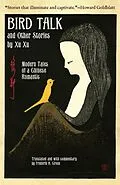Introducing the works of a major Chinese writer--liberal, cosmopolitan, and lyrically exotic--once banned but now embraced, and newly "discovered" in the West.
Xu Xu 徐訏 (1908-1980) was one of the most widely read Chinese authors of the 1930s to 1960s. His popular urban gothic tales, his exotic spy fiction, and his quasi-existentialist love stories full of nostalgia and melancholy offer today's readers an unusual glimpse into China's turbulent twentieth century.
These translations--spanning a period of some thirty years, from 1937 until 1965--bring to life some of Xu Xu's most representative short fictions from prewar Shanghai and postwar Hong Kong and Taiwan.
The Afterword illustrates that Xu Xu's idealistic tendencies in defiance of the politicization of art exemplify his affinity with European romanticism and link his work to a global literary modernity.
Autorentext
Xu Xu (1908-1980) was an influential Chinese writer who enjoyed tremendous popularity throughout the late 1930s and 1940s. After graduating from Peking University in 1931 he moved to Shanghai in 1933 to begin his literary career. He left for Paris to continue his studies in 1936 and returned to China during the war against Japan. He left for Hong Kong in 1950, and in his later fiction from Hong Kong he mostly explored the theme of nostalgia experienced by countless Chinese displaced during the civil war. Xu Xu's works were banned on the mainland from 1949 until the 1980s, and his work is now widely read in China and a frequent source material for television and the stage. In Hong Kong Xu Xu edited several literary journals and taught Chinese literature at different colleges and universities, eventually chairing the Chinese Department at Hong Kong Baptist University until his death in 1980.
Klappentext
Xu Xu (1908-1980) was one of the most widely read Chinese authors of the 1930s to 1960s. His popular urban gothic tales, his exotic spy fiction, and his quasi-existentialist love stories full of nostalgia and melancholy offer today's readers an unusual glimpse into China's turbulent twentieth century.
These translations--spanning a period of some thirty years, from 1937 until 1965--bring to life some of Xu Xu's most representative short fictions from prewar Shanghai and postwar Hong Kong and Taiwan.
The Afterword illustrates that Xu Xu's idealistic tendencies in defiance of the politicization of art exemplify his affinity with European romanticism and link his work to a global literary modernity.
Inhalt
Contents
Acknowledgments
Xu Xu's Literary Journey through Twentieth-Century China
A Note on the Translation
Ghost Love
The Jewish Comet
Bird Talk
The All-Souls Tree
When Ah Heung Came to Gousing Road
A Chinese Romantic's Journey through Time and Space: Xu Xu and Transnational Chinese Romanticism
References
